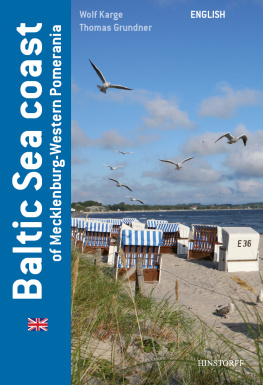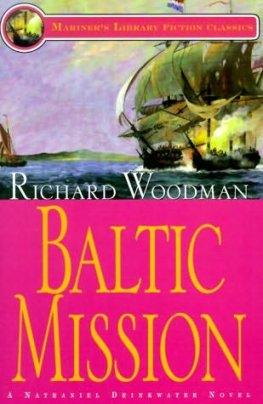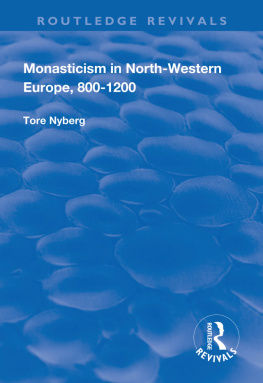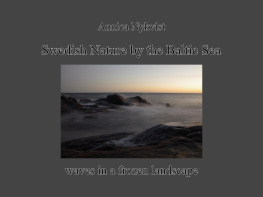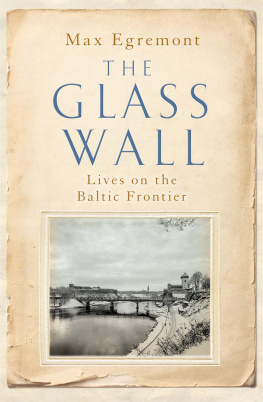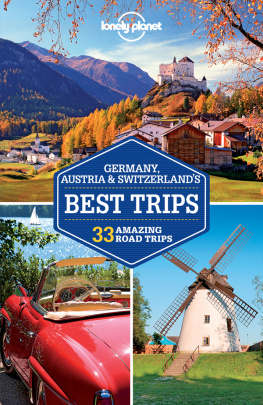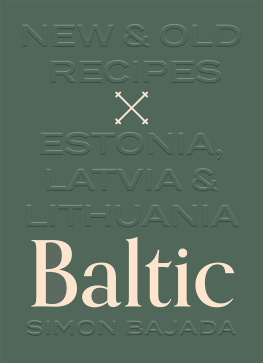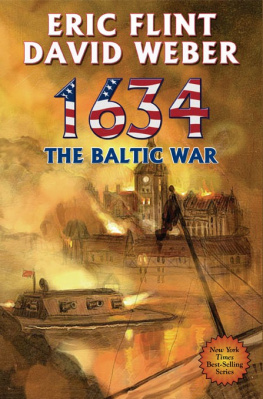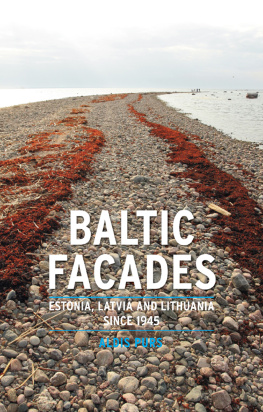Wolf Karge [text] Thomas Grundner [fotos]
Baltic Sea coast
of Mecklenburg-Western Pomerania
ENGLISH
bersetzung ins Englische: Martin Tmmler

Hinstorff

INTRODUCTION
The Baltic Sea coast of Mecklenburg-Western Pomerania can be summed up in numbers as a 1,712 km beach with over 40 islands. Most of these islands are gathered by Germanys largest island Rgen. Beyond the numbers, the sand and rocky beaches, the cliffs and dunes, the Windflchter and sea buckthorn shrubs theres also the picturesque seaside resorts, which used to be small villages. Theyre famous with over 200 years of age in a renovated coastal architecture style. Led by Heiligendamm, the elegant Grande Dame of the Baltic seaside resorts, others include Putbus-Lauterbach and Binz as the biggest on Rgen. Not to be forgotten are the Kaiserbder in Usedom, Warnemnde by Rostock and Boltenhagen by Kltz.
Over 120 years ago artists discovered the untouched fishing villages in Fischland, Dar, Zingst, Hiddensee, Usedom and Rgen. Paul Mller Kaempff, founder of the artists colony of Ahrenshoop, described it as an area without billboards and bleak utilitarian buildings an infinite amount of motifs for their plein-air painting.
The coast is a young formation from a purely scientific and geological view. The Ice Age left the Inner Baltic main terminal Moraine in the Pomeranian Stadium around 18000 BC. The last ice thrust formed the northeast running hills of the island Rgen. Only the famous chalk cliffs with the Knigsstuhl (Kings Chair) show 40 million years of earths history. They were exposed during the ice shift. The Baltic Sea is also a very young ocean. In the beginning it was just a lake from runoff ice water, which then connected with the North Sea the whole thing didnt calm down until 4,500 years ago.
Legends speak, with a wink, how the beginning and end of the biblical creation lie on the Baltic Sea coast of Mecklenburg Western Pomerania. God himself had, as he created Mecklenburg, started from the Baltic Sea area. The island Rgen was his last-minute work, created at the end of the creation of earth, as he halfheartedly threw his trowel with the last lump of clay from the island Bornholm towards the south in the evening. Thats why the island came out rough. Ten cities and 150 villages enjoy the ocean view. The larger cities still come across as Hanseatic. Stralsund and Wismar, with their medieval floor plans and preserved buildings, even made it onto the World Heritage List of the UNESCO. The big, dry red (Uwe Johnson) brick glaze has also rubbed off onto countless Gothic village churches. These architectural jewels were conserved through poverty as the best historic preservation. Their towers see far into the country to this day. They served as landmarks to aid skippers orientation just 100 years ago. Today lighthouses serve this purpose instead. Many of these are tourist destinations today.
Its controversial how far the Baltic Sea region reaches inland. One side sees the border along the old Hanseatic messenger route, which is now the federal highway 105. Others set their sights on a more southern highway. As always, the truth probably lies in between the two.
The malicious allegations of locals being underdeveloped and close-mouthed fish-heads stem from foreigners. Royal lips, however, only have praise to offer. The Hohenzoller Friedrich Wilhelm I. described his Pomeranian vassals as faithful as gold. Mecklenburger and Pomeranians are considered righteous, persistent and hard working coupled with a fine sense of humor, which always requires a serious look. This combination has been hard earned over centuries. The landscape describer Theodor Fontane is upset, These Mecklenburger are a strange gender. Theyre all talented, yet still mostly average. Despite this, theyre imbued with the belief that theyre something special. All of them are boring. And when they show their cheeky, clueless face, thats what they call humor. They might be taciturn. They are considered stubborn and slow, but once they get going, the long-winded aspect starts long-winded like the rolling hills of the Baltic Sea landscape.

Boltenhagen has two faces: the Weie Wiek in the east by Tamewitz is modern, equipped with marina, hotels and vacation homes. The old seaside resort Boltenhagen, on the other hand, retains the flair of its more than 150-years of history.

The castle Bothmer in Kltz is a pearl of a monument among the numerous castles of the country. With the consistent implementation of baroque ideals in the form of a three wing structure, the castle was finished in 1732. The landscape and building symmetrically form one unit. The seven hectares park, surrounded by a Dutch fashioned moat, is an ideal setting for the Mecklenburg-Vorpommern Festival.

A brief modern description of the frequently over-molded Hanseatic architecture in Wismar could simply be put as Gothic meets Art Nouveau. Renaissance, Baroque and Classicism all left their marks on the gabled houses. The Market Place contains the waterworks, a gem created by Philipp Brandin around 1600 as a beautiful shell for the central water supply.

The two storied half-timbered house by the Old Harbor from the mid 17th Century rests on two barrel-vaulted bays and bridges the Runde Grube. Hence its hundred year old name arch. The Grube was originally the central sewage and waste disposal of the city today its an inner-city beauty.
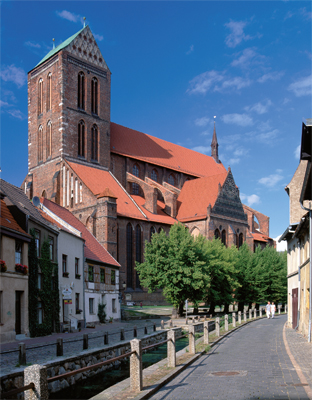
St Nicholas Church in Wismar is praised as one of the most beautiful late Gothic buildings in northern Germany. The late Gothic addiction with decoration is evident in the delicate design of the gables in the south portal and the tower. Lily friezes as well as alternating figures of Mary and Nicholas, the patron saint of sailors, can be seen.

The rhythmic beating of the ropes to the masts and the soft sound of the hull moving with the waves are the basic sounds of the sailor experience. The sight of traditional sailing ships against the backdrop of Wismar in the Old Port reinforces the judgment of UNESCO, which gave the Hanseatic city the title of World Heritage Site. The preservation of the Old Town and the orientation to the water form a tangible entity.

Timmendorf on the island of Poel is often mistaken with the seaside resort Schleswig-Holstein because of the name, despite the distinctive appearance of the fishing towns landmark. The lighthouse has been guiding seamen from this spot since 1872. In 1930/31 the height was increased by four meters to a total of 21 meters and a new lantern was installed. The new top stands out in contrast to the white base. The lean direction- and cross light was completely renovated in 1996/97.
Next page
